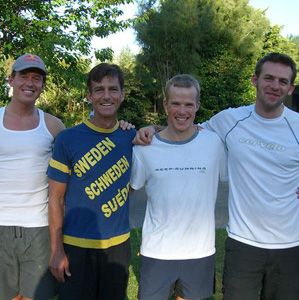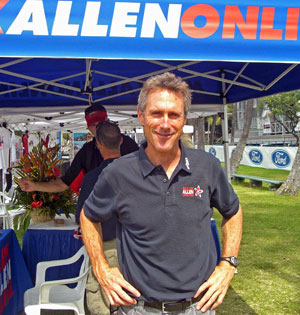Scott Tinley: his body sidelined, his brain in the game
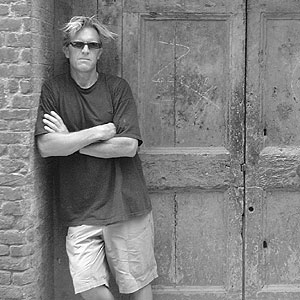
Scott Tinley is one of the "Big Four", along with Scott Molina, Dave Scott and Mark Allen. Tinley won the Hawaiian Ironman in 1982, and again in 1985. He was second place three times, and third place twice. His wins at other Ironman events are legion.
That was then. His most recent decade has been a physical trial, culminating in hip replacement surgery earlier this month. But the decade has been good for his fertile, impatient brain.
SLOWTWITCH: Why don't we start with these questions, as warm-ups.
SCOTT TINLEY: Warm ups? Like jumping Jacks? I asked Jack LaLanne one time if he'd invented that move but he said he couldn't take credit for it. It was one of the most interesting days of my life, hanging with Jack. A true American original. I pitched the story about Jack and I training together to a big men's magazine and they liked it but stole the idea and sent their own staff writer. Two weeks later I received a note from the editor with a check for $50. He called it a “kill fee” and it killed any thoughts of ever writing for the popular press again.

SLOWTWITCH: Why don't we recap, for those who don't know. You've segued nicely into a career in academia. You teach creative writing at San Diego State, and I believe I heard that you were also teaching elsewhere. Was it Chapman College?
SCOTT TINLEY: Actually, I haven't taught writing for a few years now. After finishing my second round of grad school I was teaching various writing courses at Grossmont College in east San Diego. But as a part-timer I wasn't getting the good assignments—the creative writing classes, poetry, comparative lit—just the critical theory, rhetoric and composition courses. I was doing close reads of 400 lower division essays each term and I couldn't see myself sustaining that for more than a few years. Writing always carried a certain jouissance for me and these classes were altering my relationship with the craft. I didn't want to embody that Heller quote from Catch 22: “He knew everything about literature except how to enjoy it.”
About the same time I was talking with an Associate Dean at SDSU and he brought up the curriculum for a new MBA program in Sport Management that he was working on. “It needs a soft science,” I told him, “a sociology or philosophy of sport tossed in with the econ, marketing and stats.” Prof. Lackritz turns to me and says, fine, you teach it. That was almost five years ago and I've been teaching upper division and grad level sport humanities, variously, at three different universities since then. Thank you, Jimmy.
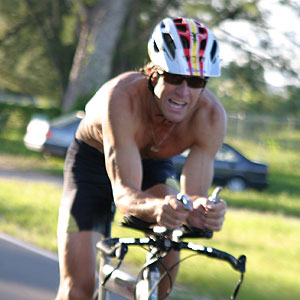
If I think about it, there was something magical about the way I was sucked back into sport through a discipline that I'd run towards to get away from a life of athletics. It's been wonderful because I can match the theoretical with the phenomenological, the books with the street. But the true gatekeeper in the Academy is still the Ph.D. and even with two masters, one a terminal degree, half a dozen books [published] and plenty of teaching experience, you're never really accepted without a doctorate. So, that's what I'm chipping away at now and baby, where I'm at—Claremont Graduate University—it ain't easy.
SLOWTWITCH: You wrote a book about the transition into retirement from professional sports (we reviewed it favorably here) and of course you continue your monthly columns in Triathlete Magazine. But it seems to me your post-retirement intersections with triathlon were as much about your current passion for writing as they were about sport. Of the Big Four, you were the one who ran the furthest and the farthest from Triathlon after leaving competition. Sometimes I get the feeling triathlon was like a bad religion to you, like you were wrapped up in a cult, and it's taken you all these years to detox and deprogram.
SCOTT TINLEY: That's not an unfair analogy, as macabre as it sounds, but yes, I required a certain distance from the sport before I could fully comprehend where I'd been, what I'd done and where I needed and wanted to go. Although my involvement with triathlon had religious connotations I would never label it “bad.” There was, and remains, a certain amount of catholic guilt, not so much about the time and effort I invested in the sport but the wreckage of missed opportunities left in the wake. Family, friends, good surf, unique experiences; hell I'd travel to a quaint village in France to race for the weekend but would rush back so that I could be there for the Tuesday Run. I remember lying on the floor of my home library/skunk works one week in 1999, prostrate and thinking that this must be what detox is like. I'd completely removed myself from exercise, sugar, caffeine, sunshine, people… all the things that had been propping me up for the last few years of my career. I was paralyzed and it was all I could do to reach for a book and read a passage. That's when I discovered what I really wanted to do. And it had absolutely nothing to do with sport. It's that wonderful Byron quote: “For a man to become a poet… he must be in love and miserable.” I wouldn't say it was a divorce or even a long separation but something in me needed to die.
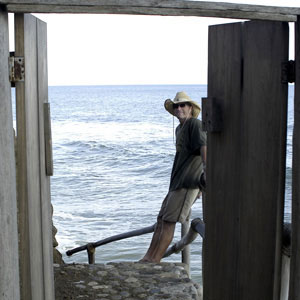
And when it did there was a big hole that I wasn't about to fill with the same dirt. I tried coaching a few folks and enjoyed talking to them about their personal lives but when it came right down to the pragmatics of a training program I knew my heart wasn't in it and I couldn't justify taking their money. Mark and Dave and Molina and Huddle and Roch, Riccitello… these guys are the best because they've seen it all, retain the passion and have all been self-coached their entire careers. Collectively, they represent the sum of over 100 years of cutting edge and experiential dwelling in endurance sports.
SLOWTWITCH: If you don't mind, one more along those lines. One of my favorite myths is the Old Testament Jacob wrestling all night with the Angel of God, refusing to let go until the Angel gives Jacob his blessing. It's the archetype of the striver: always questioning, won't go along, can't get along. This resonates with me, and pretty well describes you. But the last decade has also been a role reversal for you, where your old life as a pro triathlete has had its hold on you, and you've been unable to break free of its grasp. I'm wondering whether this hip operation has had any impact on that struggle.
SCOTT TINLEY: There's this great line from Act I, Scene V, in Hamlet where his ghost says, “Pity me not, but lend thy serious hearing to what I shall unfold.” You and I grew up in the 60s. And unless you lived in a cave you could not have come through unaffected. Now more than ever we have to question authority as this administration has hegemonically crafted this culture of fear that we are shadowed by. I think that now, my rebelliousness is better focused and backed by all the work I've done to arm myself with what Emerson calls “facts shot through with spirit.” You've held yourself to a personal standard as well; something I admire in people. But I think raising two teenagers helped me to learn to pick my battles lest I end up Sisyphusian, pushing that rock for what? My friends from the 60s who ended up making a lasting difference were the ones who went back to law school and then practiced serious environmental and labor law; full on David/Goliath shit. Maybe six months ago I finally stopped fighting that Jacob of my past and in doing so, I was blessed with the ability to look at sport in a new and accepting light. Humility is a tough trait to learn, maybe the toughest. It seems like every few years I'm given some tragedy to help me with my ongoing challenge to be humble. This surgery was certainly one of them.
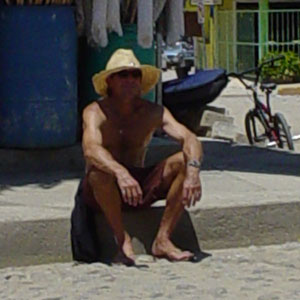
SLOWTWITCH: You blogged about your hip replacement. You were obviously humbled by your situation, especially post-op. But what really surprised me was the way you wrote about those with whom you came in contact. About your roommate, you start a blog entry with, "Gene is going home," as if you were going to miss him. Another blog entry starts, "Last night was Cora’s birthday." You were always likeable in your younger years, but you didn't have unlimited patience for people. Is this a kinder, gentler Tinley we're seeing and, if so, is it as surprising to you as it is to me?
SCOTT TINLEY: These minor folk heroes are all around us. But when all you can think about is, “What will serve my needs?” you'll never see them. I'd never had major surgery, never experienced that kind of pain or been in a situation where so many selfless people came forth in the ordinary course of life to make me comfortable. I thought a lot about when I worked as a paramedic in the early 80s and how much inner peace I had those years. That peace was all but absent from 1984 to 1999, fifteen years of me, me, me. Of course, that narcissism is the bane of high level sport, the tyranny of the pro jock. Sometimes I think about Paul Huddle. Here was a guy who could have been top ten in the world but he just wasn't greedy enough. Same thing with Jody Durst and Ray Browning and Linda Buchanan. Not to say that you have to be a jerk to succeed in triathlon but it helps if you can somehow compartmentalize your self-centeredness. Being a writer, you train yourself to see, to really see those little darlings of the human condition. Because that's what resonates with readers. But first you have to drop your guard and be willing to bleed yourself on the page before you can describe the fate of the Other. That's why we can never really escape the tragic heroes of the past — they are just reified versions of our present selves. But first you have to cut your own vein. All the way to the bone.
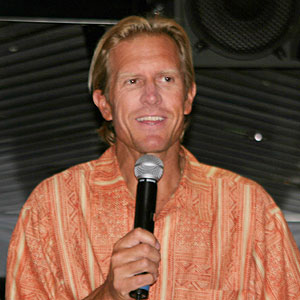
SLOWTWITCH: This entry from your blog stood out: "If it was four or six months form now, I'd run the 10K to Dr. Rogerson's office and say what up, Doc?" Correct me if I'm wrong, but your athletic endeavors in recent years have been almost entirely in the ocean. I doubt you've run six consecutive miles in five years. Was that a throwaway line, or have you been thinking about taking that body of yours out for a run?
SCOTT TINLEY: I have no doubt I'll run again. But 10ks will be my limit and perhaps 10-15 miles per week my range. That's all I need. It will provide everything I'd like to glean from that particular terrestrial activity. I'm grateful for all that running gave me, though not overly fond of what it took in its tenure. Running is primal, irreplaceable. But 2 miles at low tide will shoot that fact through with all the spirit it needs.
SLOWTWITCH: Three-quarters of the Big Four are coaches. Dave is racing Kona again this year. Mark is more involved with triathlon than I've seen him in past years. Skid is training 20 hours a week and will probably race a full season. Whether it's a former relationship, a former religion, a former employer, one sign you've finished processing the loss is when you can move on and leave the scene completely. But another sign you've made your peace is when you can come back and hang out with your former flame, or spouse, or employer, with no struggle or heartburn. Will your own arc take you further away from triathlon, or back toward it?
SCOTT TINLEY: I'd like to do a few races next summer, especially our race that Terry Davis and I put on in San Luis Obispo in the Fall. I'm working on this book on returning war vets now and many of them speak about a fragmentation of the soul; a splitting of something deep and at the core. Though I'm lucky not to have been in battle somehow I understand exactly what they're talking about. But after nine years of feeling fragmented there is a kind of mending and I think that I can go to Kona and watch and cheer on Dave and not have anything but admiration for he and others for what they are doing. I'll never remarry the sport but I can be at peace with it. To do that, though, it'll have to be on balanced terms that allow me to keep striving in my present disciplines while constantly working on the humility that accepts all that was offered me in the past. It's never easy.
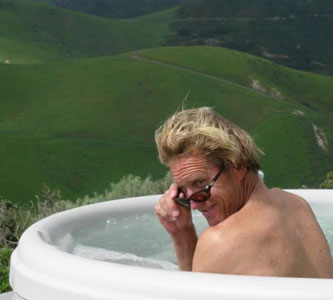
SLOWTWITCH: I've been thinking about the folks that I admire—authors mostly, but others as well—who've integrated or utilized human motion to achieve or experience things not really sports related. Examples: There are two books on a lot of must-read lists. One is "The Discovery of France," by Graham Robb. He writes an Annales School sociohistory of post-revolutionary France, and you keep seeing these references to Mt. Ventoux, the Perigord, and then you find out he's an avid cyclist and his research was conducted over fourteen thousand miles on his bike. Then there is Will Self's book on Psychogeography, illustrated by Ralph Steadman. He flies to an airport, and then walks from the airport to downtown, trying to uncover the truest things about an area from a 12 or 15 mile trek. I'm fascinated by Chuckie V soloing the entire PCT… twice… and by Gabe Jennings chucking a World Class middle distance running career to ride a beater bike several thousand miles through Mexico and Central America. Does that sort of stuff inspire you? Do you have a reaction to that?
SCOTT TINLEY: There are several ways to approach this somatic transcendence that you reference. I enjoyed Robb's book and was a fan of Steadman soon after reading the good doctor Thomson's "Curse of Lono" in '79. Chuckie V was always heroic to my thinking. But while the generic concept of mind/body connection has been bantered around in New Age healing circles for decades, the specificity that you are drawn to, the actual purposeful voyages you speak of, have only come to popular culture (and therefore to the masses) on the heels of some kind of re-acceptance of interdisciplinarity. We used to be a society of generalists, jack-of-all-trade McGyverites who could fix a leaky sink, sell an insurance policy and stay friends with a goth-dappled daughter. But something happened and for the longest time we flocked to "the specialist." Of late, people are realizing that you can fly fish to Mozart and make love with images of red sunflowers in your head. And if you can afford sixty thousand dollars you can have someone push you up Everest.
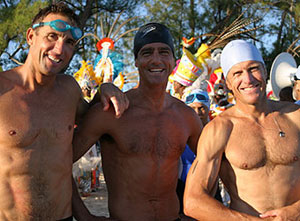
I'm not talking about multitasking but the notion of using our physicality to unlock parts of our being we somehow have cordoned off. One of the best texts on the vicissitudes of globalization is Franklin Foer's "How Soccer Explains the World." It's the idea that we are not a sedentary species and some organic spatial traverse will propagate a kind of spiritual transcendence. It's a simple concept and is at the very foundations of multisport: we require a physical challenge to nurture and sustain emotional and intellectual growth. People don't go to Kona to get fit or tan. To a one they all speak of "finding something." That something is what modernity hides from us.
When I decided that I wanted to be a college professor one day, I initiated a national search for models; former successful professional athletes that had achieved tenure at a major university. I came across exactly one person—Michael Oriard, a Sports Literature scholar at Oregon State who played for the Kansas City Chiefs and earned his doctorate from Stanford. The point is, we can over-identify in sport, as I did, or we can use it as a pleasurable tool to learn about all that we are and all that our world might be.
Of course the other approach is to say, "Fuck it. I don't care what is happening to my body or my mind. It feels good so I do it." That's what I'd recommend.



